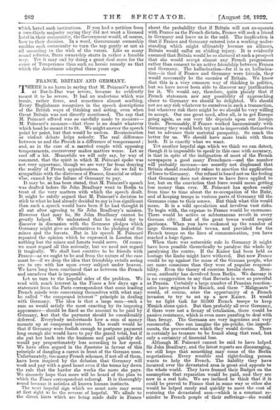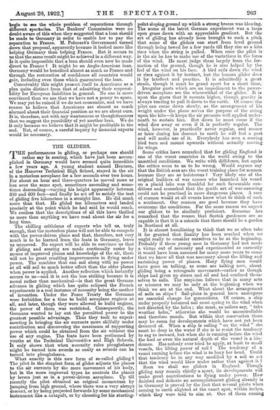FRANCE, BRITAIN , AND GERMANY.
THERE is no harm in saying that M..Poincare's speech at is was severe, because he evidently meant it to be severe. It had an undertone which was ironic, rather fierce, and sometimes almost scathing. Every- Englishman recognizes in the speech descriptions of the British ways of thinking and acting, even when Great Britain was not directly mentioned. The cap that M: Poincare offered was so careftilly made to measure- Poincare's measure—that .there is no doubt whatever which head he meant it to fit. We mightanswer the speech point by point, but that would be useless. Recrimination or violent • debate helps nobody. The real difference between us and the French is. a difference of temperament ; and, as in the case of. a. married couple with opposing temperaments, controversy makes matters worse. Let us cool off' a bit Meanwhile we will only say, by way of comment, that the spirit in which M. Peincare spoke was not. very opportune, though we are very far from denying the reality of : French apprehensions. Nor do we fail to sympathize with the-distresses of France, financial or other- wise, caused by the failure of Germany to pay.
It may be, ashes been stated, that 11:Poincare's speech was drafted before Sir JOhn - Bradbury went to Berlin to treat of the very matters with. which the speech dealt. It might be subtly argued that M. Poincare's. decision- to stick to what he had already decided to say is less significant than such a .speech would have been if he had thought it all out after agreeing. te Sir Jahn Bradbury's mission. However that may be, Sir Sohn Bradbury cannot be greatly helped. We understood that he would try to discover in discussion with the Germans pledges which Germany might give as alternatives to the pledging of the mines and the forests. But in his speech M. Poincare repeated the opinion which he expressed in London that nothing but the mines and forests would serve. Of course we must regard all this seriously, but we need not regard it tragically. We shall best contrive to be friends with France—as we ought to be and from the nature of the case must be—if we drop the idea that friendship entails seeing eye to eye with her upon every subject under heaven. We have long been, convinced that as :between the French and ourselves that is impossible.
Let us turn to the hopeful sides of the problem. We read with much interest in the Times. a few days ago a statement from the Paris correspondent that some leading French minds were concerning themselves with what may be called "the compound interest;"' principle in dealing with Germany. The idea is that a large sum—such a sum as would satisfy the most exacting by its imposing appearance—should be flied- as the amount to be paid by Germany, but that the payment should be considerably deferred.' Everybody understands how a, sum of money mounts up at compound interest. The result would be that if Germany were foolish enough to postpone payment long enough she would have to pay the grand total, but if she put her back into the business and paid quickly she would pay proportionately less according to her speed. We have often argued in the Spectator in favour of this principle of dangling a carrot in front of the German nose. Unfortunately, too many French schemes, if no-tall of them, have been inspired by the delusion that Germany will work and pay with a good heart even if the terms lay down the rule that the harder she works the more she pays. We sincerely hope that more will be heard of the plan to which the Times correspondent referretl. It is thoroughly sound because it satisfies all known human instincts.
The next hopeful sign which we must note may seem at first sight to be the reverse of hopeful. We allude to the direct hints which are being made daily in France about_ the probability that if Britain will not co-operate with Fiance as the French dictate, France will seek a friend in Germany and leave us in the cold. The implication in that if France and Germany entered into a working under: standing which might ultimately become an alliance; Britain would_ suffer an abiding, injury. It is evidently assumed that Britain would be so alarmed-at such a prospect that she would accept almost any French programme rather than consent to an active friendship between France and Germany. The hallucination—for it -is an hallucina- tion—is that if France and' Germany were friends, they would necessarily be the enemies of Britain. We know that this is a. very common way of thinking in politics, but we have never been. able to discover-any 'justification for it. We would, say, therefore,. quite plainly that if French statesmen saw any possibility of approaching closer to Germany - we should be delighted.. We. should not see any risk whatever to ourselves in. such a transaction, but whatever risk there might be we should be very willing to accept. Our one greatneed, after all,.,is to get Europe going again, as our very life depends upon our foreign trade. Presumably, if Fiance 'worked liarraoniou,slY with Germany they woulaboth try not to impoverish themselves but to advance their material prosperity. So much the better for us.. We should.' have more trade with them both. It is exactly what we want.
Yet another hopeful sign which we think we can detect; though itie impossible to speak. in this case with accuracy, is that in. spite of 'the indignation, of most of the 'french newspapers a, good' many Frenchmen—and the-. number will' probably. increase—are secretly, not displeased. that Britain, should .resolutely refuse to sanction the application of breath Germany. Our refusal is basednot on the feeling that Germany does not :deserve to have force applied to her, but on the conviction that force ,would. mean getting less money than ever. M.' Poincare, has spoken easily from time to time about the re-occupation of 'the Bilk; and of keeping. troops. in various_parts of Germany till the Germans come to their senses. . But think what this would mean. It- is a wild speculation and involves vast risks. To begin with, the expense to Fiance would be enormous. There would be active or subterranean revolt, in every, German city. Most of the great- towns. would' require garrisons. When you. have . reckoned up the number of large German industrial towns, and provided' for the French troops on the lines of communication, you. have reached a-huge figures When there was autocratic rule in, Germany it might have. been possible theoretically -to paralyse the whole by paralysing. the centre: If the Keiser. had been held as hostage the limbs-might have withered. Bid, now France would be up against the .mass of the German people, who are - more conscious than they, were of popular responsi- bility. Even the theory of, coercion breaks. down. More- over, .authority has devolved:from Berlin.. We, daresay it is no exaggeration to say that Bavaria. is now as powerful as Prussia. Certainly a large number- of', Pro ssian. reaction- aries have migrated to Munich,, and these " Maligna,nts " would, of; course, seize the, opportunity of a French invasion to try, to set up . a new, Kaiser. It would be no light task for 50,000 French troops- to keep MUM& alone quiet. But then probably alLover Germany, if there were not a. frenzy of :retaliation, _there would, be passive_resistance, whichis_even more puzzling to deal with than frenzy. The Germans, are very ingenious_ and very_ resonrceful.. One can imagine the .pin..pria'k., the impedi- ments, the provocations. which.they would .devise. There is_ certainly no treasure to .be. found along that .road, . but only a ',certainty of .financialloss: Although M.' Poincare cannot be said . to have. helped. Sir. John Bradbury, and the latest reports are discouraging,, we- still hope that. something may, come of the Berlin negotiations. Every sensible and right-feeling, person wants, to help the French. The liability they have incurred over the devastated_ area is. gre,at.and appeals. to the whole 'world. They have, framed. their Budget on the assumption that- reparation , would be .paid,. and they are now in a real- hole:. We.are. inclined 1 to think that if. it could- be proved to Fiance that in: some way or other she would be helped_ surely and_ quickly to meet the cost of restoring the devastated. area--which, is. a. constant re- minder to French people of ' their sufferings—she would to see the whole problem of reparations through erent spectacles. The Bankers' Commission were no doubt aware of this when they suggested that a loan should be made to Germany in order to enable her to pay the reparation to France. M. Poincare's Government turned down that proposal, apparently because it looked more like helping Germany than helping France. But it occurs to us that the same resultmight be achieved in a different way. Is it quite impossible that a loan should even now be made direct to France? It might be an Anglo-American loan. Germany would be benefited almost as much as France and through the restoration of confidence all countries would gain, including even those which guaranteed the loan. Conceivably this might present itself to Americans as a plan quite distinct from that of admitting their responsi- bility for European liabilities in general. No one is more convinced than we are that we have not a penny to spare. We may yet be ruined if we do not economize, and we have reason to believe that Americans are almost as much alarmed about their financial position as we are about ours. It is, therefore, not with any wantonness or thoughtlessness that we suggest the possibility of yet another loan. We do it only because we believe that it might be profitable in the end. But, of course, a careful inquiry by financial experts would be necessary.
- I 1111



































 Previous page
Previous page